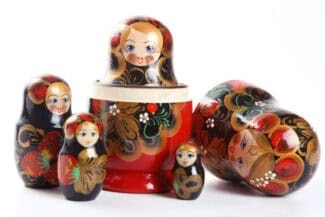We have clients from every corner of the world.  And of course the pronunciation issues we hear are as varied as the sounds a human can make.
And of course the pronunciation issues we hear are as varied as the sounds a human can make.
How Russians pronounce American words
We find accent variations even within countries, especially the vast area of Russia and its neighbors. However, many Russian speakers share speech patterns that deviate from Standard American English (SAE) and identify the speaker to the American ear almost immediately as Russian, or from an area nearby.
Russian and Eastern European speakers tend to speak with a very firm jaw.
They let their lips and tongue do most of the vowel formation; this is very different from the open and loose way of speaking that is the bedrock of SAE. The center of vibration for the speech sounds of Russian falls more in the area of the soft palate and throat, creating a “darker” sound than in SAE. The oral posture for SAE speech vibrates more in the center of the mouth, resulting in a brighter, more “forward” sound.
How to pronounce certain vowels
For example, to pronounce the American English short vowel “IH”, as in the words “tin”, “mint”, and “dinner”, you have to open the mouth slightly and drop the jaw just a bit, floating the tongue in the center of the mouth. Often we hear Russian speakers pronounce that short “IH” closer to the sound “EE”, with a tight jaw and the tongue pressed against the back teeth, so that tin, mint and dinner, sound like “teen”, “meent” and “deener”.
There is also a tendency for Russian speakers to add a “Y-glide” (a sound like “yuh”) to many vowels, especially after the consonants “L”, “N”, “S” and “T”. So again, using the short vowel sound “IH” in the word “live” for example, a Russian accent will go toward “liyuv”. Listen to this example:
Speakers with a Russian accent must learn to pronounce these vowels without the Y-glide.
We find equally fascinating issues with some consonants as pronounced by our Russian clients. The initial letter “H” that begins the word “here” for example, when spoken by some Russian natives, sounds almost like CHERE, with the CH sound deep in the throat; liquid and airy, with a rough edge; like the sound of a cat hissing!
Try to say the initial letter H (in the word “here”) without producing any “rattling”, keeping the throat loose and open and relaxing the back of the tongue. Practicing by breathing out a “HA!” or “HO!” helps to locate and feel that airy sound.
Another signal consonant
Some of our Russian clients have problems with is the initial “R”. We notice that a mysterious vowel (actually a schwa) appears before the onset of the letter. For example, instead of beginning the word “rest” with initial R, we often hear it pronounced by Russian natives as “uh-REST”. As you can imagine, this can lead to confusion; certainly over the phone but also face-to-face, in business meetings or even casual gatherings. Was he “rested” or “arrested”? This can be a problem!
Try starting your “R” words by actually exaggerating that vowel: instead of attempting to “hit” the R directly say, “uhhhhhRRRRRRRRRRRR” and then pronounce the R word. We find this can work wonders to tune the ear to the target sound:
One thing we have learned in working with our Russian clients is their love of learning, their enthusiasm for the classwork and their wonderful easy laughter which in our one-to-one sessions is delightful.
ABOUT THE AUTHOR: Deb Victoroff, M.S. is a native Midwesterner with a passion for reading, writing and the spoken word. Deb worked for the last 15 years as a story editor for the TV show “The People’s Court”, a 2-time Emmy award winner. In addition to working her AccentsOff clients improve their pronunciation, she keeps them entertained with her catchy, humorous stories. Deb maintains a culture blog that shows off her witty writing and sparkly soul. (idontunderstandanythinganymore.blogspot.com).

